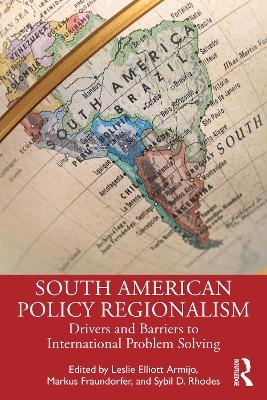
South American Policy Regionalism
Routledge (Verlag)
978-1-032-85724-4 (ISBN)
“Regional cooperation exists, but looks different in the global South than in the European Union,” claim the contributors to South American Policy Regionalism, which offers novel theory, methods, and Latin American case studies of joint governance efforts in nine international policy arenas, ranging from illegal drugs to artificial intelligence.
Contrasting three major schools of thought in international relations (highlighting power, institutions, and ideas), this book introduces the idea of international policy regionalism as a framework for informed debate about international policy-sector interactions in a regional space. Beginning with a conceptual approach applicable to any world region, it includes a brief history of Western Hemisphere regionalism to aid in future cross-regional comparisons. An international group of contributors constructs rich narratives of the politics of Latin American policy sector evolution since the Cold War. Besides the aforementioned, included sectors span regional development banking, infrastructure planning, electricity distribution, migration governance, climate action, neglected tropical diseases, and food policies.
This volume equips readers from various academic disciplines and the policy world to understand the relevance of core international relations theory for the analysis of policy sectors that cross national borders, both within Latin America and elsewhere, and especially throughout the global South.
Leslie Elliott Armijo holds research affiliations with Simon Fraser University (SIS) and Boston University (GDP Center) and has been a Visiting Scholar in Rio de Janeiro (PUC), New Delhi (CPR), Berlin (FUB), and São Paulo (USP). She is (co)author or editor of The BRICS and Collective Financial Statecraft (2018), Unexpected Outcomes: How Emerging Economies Survived the Global Financial Crisis (2015), The Financial Statecraft of Emerging Powers (2014), Debating the Global Financial Architecture (2002), Financial Globalization and Democracy in Emerging Markets (1999), and fifty odd articles or chapters on ethics, democracy, growth, and international politics in Latin America and India. Markus Fraundorfer is Associate Professor of Global Governance at the University of Leeds and the program director of the MA Global Governance & Diplomacy. He examines current transformation processes in global governance and previously researched Brazil’s role in regional and global governance. He worked at the Universidade de Sã Paulo and was a visiting fellow at the Pontifíia Universidade Catóica do Rio de Janeiro (PUC-Rio) and the Universidade de Brasíia. His previous books include Brazil’ Emerging Role in Global Governance: Health, Food Security and Bioenergy (2015), Rethinking Global Democracy in Brazil (2018), and Global Governance in the Age of the Anthropocene (2022). Sybil D. Rhodes directs the Department of Political and Juridical Sciences and the Foreign Policy Observatory at the Universidad del CEMA in Buenos Aires, Argentina. Her areas of expertise include the politics of international public policy and multilateral cooperation, particularly in the policy arenas of migration, citizenship and human rights, as well as infrastructure and consumer protection. She is the author of Social Movements and Free-Market Capitalism in Latin America (2006).
Foreword
Jorge Heine
Editor's Preface
Part 1. International Policy Regionalism: Why, How, and the Theoretical Significance of Latin America
1. How Latin America Cooperates: A Brief Look at the Historical Record
Leslie Elliott Armijo, Markus Fraundorfer, and Sybil D. Rhodes
2. Theory: The International Relations of Regional Policy Cooperation
Leslie Elliott Armijo, Markus Fraundorfer, and Sybil D. Rhodes
3. Methods: Investigating International Policy Regionalism in the Global South and Beyond
Leslie Elliott Armijo, Markus Fraundorfer, and Sybil D. Rhodes
Part 2. International Power Structures and Policy Sector Results
4. Illegal Drugs: How the Support of Prohibition Undermines Effective Regional Solutions
Nicolas Alexander Beckmann
5. Infrastructure: Explaining the Divergent Experiences of Central and South America
Giovanni Agostinis and Stefano Palestini
6. Long-Term Finance: The Challenging International Politics of Regional Development Banks
Leslie Elliott Armijo and Verónica Rubio Vega Sepehr
Part 3. The Strength of Issue Arena Incentives
7. Energy: Interconnection without Integration
Klaus Guimarães Dalgaard and Felipe Mendes Cardoso
8. Immigration and Asylum: The Political Economy of Migration Governance in South America since the Cold War
Sybil D. Rhodes
9. Climate Action: Splintered Multilateralism and Networked Transnationalism
Amy Below
Part 4. When Norm Entrepreneurs Lead
10. Neglected Tropical Diseases: Health Governance at the Global–Regional Nexus
Markus Fraundorfer
11. Food Policy: Examining the Influence of Brazilian Coalitions
Carolina Milhorance and Paulo Niederle
12. Artificial Intelligence: Latin America’s Contested Norms
Glauco Arbix, João Paulo C. Veiga, Scott B. Martin
Part 5. Conclusions: Findings and Further Questions, Empirical and Theoretical
13. Lessons from South American Policy Regionalism
Leslie Armijo, Markus Fraundorfer, and Sybil D. Rhodes
| Erscheinungsdatum | 12.09.2024 |
|---|---|
| Zusatzinfo | 10 Tables, black and white; 3 Line drawings, black and white; 3 Illustrations, black and white |
| Verlagsort | London |
| Sprache | englisch |
| Maße | 152 x 229 mm |
| Gewicht | 793 g |
| Themenwelt | Sozialwissenschaften ► Ethnologie |
| Sozialwissenschaften ► Politik / Verwaltung ► Europäische / Internationale Politik | |
| Sozialwissenschaften ► Soziologie ► Spezielle Soziologien | |
| ISBN-10 | 1-032-85724-2 / 1032857242 |
| ISBN-13 | 978-1-032-85724-4 / 9781032857244 |
| Zustand | Neuware |
| Haben Sie eine Frage zum Produkt? |
aus dem Bereich


